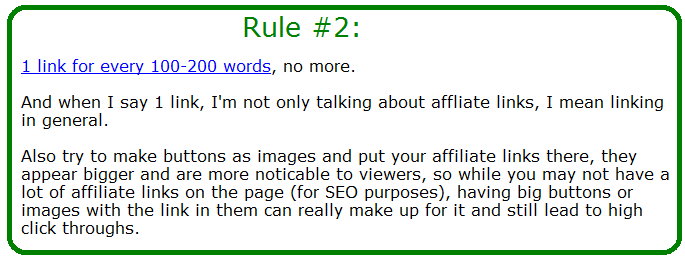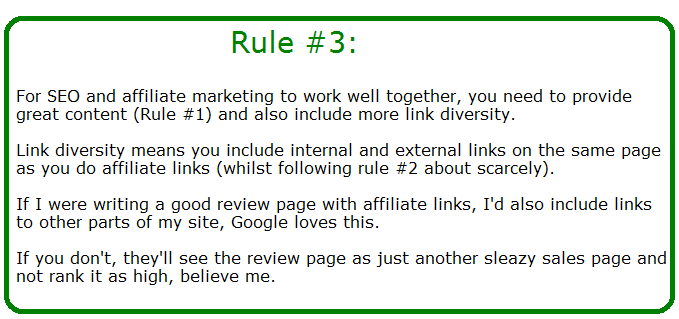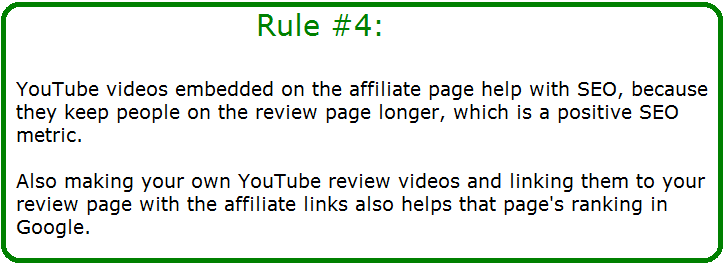There’s a rumor and myth in the affiliate marketing world that affiliate links can hurt SEO. Is it true? It can be but if you follow 5 rules, it won’t hurt rankings.
But before I get to the 5 specific rules, let me explain:
Contents
Why affiliate links generally do NOT hurt SEO rankings.
There are 4 reasons why I say this:
1) I’m an affiliate marketer and on many of the sites I do it on, I also do it through SEO.
2) I have not seen any major decline or Google penalties in my rankings from practicing this.
3) There are endless websites I could cite that prove that statement true, and I will actually point to several in this article to illustrate my point. In fact, I did a post on SEO not being dead and cited 5 websites, all of which have affiliate links on pages which rank high on Google.
4) If this practice did not mix well with SEO, there wouldn’t be so many websites practicing it and ranking so high, for so many valuable keywords on Google (many of which are mine), but since they are, that’s a myth we can scratch off the list of worries.
While most of these worries are unwarranted, there’s more to this…
There’s a big reason why in my main statement above, I said generally in yellow.
And this is because there are circumstances within which affiliate URLs will hurt a website’s SEO, but it has NOTHING to do with the actual URL or the practice of this business model.
You see, good and bad SEO results are a combination of things.
It’s not like one good thing on the site will have it rank high or one bad thing on the same site will cause it to crash, there’s a ranking algorithm in the mix here and it takes into considering way more than just 1 thing…
Now while there’s 100’s of things I could talk about in regards to what goes into ranking algorithms, in my experience, it’s not a good idea to start thinking about this stuff so meticulously, because you simply can’t do it.
There’s just too much stuff to worry about and you’ll drive yourself insane overthinking it and from that, you’ll never make any headway in SEO, because you’ll always be worrying that you’re violating something, somewhere on your site.
That’s just bad overall, don’t do it…
Here’s how you should approach it (The 5 rules):
Whatever question/s you have on SEO, whether it be the topic we’re discussing here now, or anything you hear with regards to rumors, what’s good or bad for it, just do this:
Run these things through the following 5 rules, and in doing so, you’re going to make affiliate marketing via SEO a much simpler process for yourself:

Everything you do to get higher organic rankings needs to start with this rule in mind (and practice). I’m truly serious when I say that you should start with this rule. Its one of the main trends I talked about here.
If this rule is not followed, you can forget high rankings and being a successful affiliate. It won’t happen, it can’t.
So let’s apply affiliate marketing to this 1st rule:
Let’s consider that you’re running a review page, and it’s getting traffic. Obviously, that review page has referral URLs. It has to.
- Will it be penalized?
- Will it see high rankings?
Well let’s find out:
- How many actual promotional links are there on the review page?
- Are there a few, are there too many?
I would say if there’s too many, such as one on every single sentence you write, you need to reduce that by at least 50%. Why?
Let’s go back to the rule and here’s how it applies:
Too many would interrupt the reading flow of your visitors, causing them to either leave too early, or get annoyed and leave anyway. And that will negatively affect the ranking of that review.
It only makes sense because Google looks at how users look at your site, the more positive their experience, the more positive they’ll see your site.
Now too few is a better option yes, but that would probably hinder sales. So what can you do? Here’s my suggestion:

Scarcity with linking and focus on content is better in this case, so make sure you follow rule #2. Now this raises the next very important rule:
If you want to rank your pages with affiliate links high on Google, you can’t ONLY have those kinds of URLs on those pages, there needs to be more diversity…

Internal linking on your site is 100% guaranteed to help SEO, and I have truly noticed that there is strong evidence to this:
For one of my websites, which features a lot of review pages and promotional URLs on it, when I diversify it and include more internal ones within the same reviews, it ranks better.
For pages which do not diversify, they hardly ever rank well.
The big reason for this is again, back to rule #1. If all you’re doing is trying to send people to a product page to sell them something, your review page’s value is not considered high.
If you’re providing a good review and pointing people to more than just the sales page (your referral URL), it shows you seek to help people and raises the review page’s value.

Out of the 5 rules, this is actually optional, but if you’re trying to rank a review page with affiliate links and there’s a lot of competition, applying this rule may give you the edge (well it actually will).
I have noticed that some of the top review sites I find on Google that consistently rank on the first page have at least these 4 rules in place. This leads me to talk about one of the sites I actively follow:
That is a review site (here it is) that literally does nothing but provides reviews for programs and pretty much every single page that site has, also has affiliate links.
Now this is one of the most extreme examples I could find where the person engages in some truly aggressive affiliate work and yet has their site rank VERY high for the search terms of products he’s reviewing.
While his approach to selling just about every program he reviews isn’t something I agree with, the lesson here is that you can pretty safety practice promoting things on your site without fear of Google striking it down.
Now that site from my analysis gets high rankings because:
The person provides a good quality review, and that basically nails down rule #1 I mentioned.
He does scarcely point to his promotions within each review, which covers rule #2.
And he also does point people to other blog posts he has on just about every review (which also covers rule #2).
He also makes his own YouTube videos, which themselves also hold great value, which is rule #1 and it is on his review pages and the actual YouTube video, in the description points to his review, which adds link juice to the page and helps it rank better.
So rule #4 is covered here as well and by the way, this practice is also a great way to get backlinks.
But there are also 3 additional things he does:
1) He reviews the product WAY before it’s release, which at the time has no keyword competition, so he can easily hit the first page without much effort.
2) His site is pretty developed and has long since passed the sandbox stage, which means it ranks high, pretty quickly.
3) Within each review, what he also does is, he inputs the keyword he is targeting to rank for within the images he provides. This improves his ranking as well (read my 10 tips to make sure you’re doing all this stuff too).
Don’t worry about all the details, focus on this:
Like I said before, rather than over analyze every little thing he’s doing, my main point with this person’s site is to show that its totally possible, and safe to practice affiliate marketing and still keep high SEO rankings.

Essentially when someone prioritizes selling over helping, they are violating rule #1, which time and time again, throughout this post, I’ve said is the MOST important rule you cannot break.
- Start trying to sell people stuff and you will naturally reduce the value of the content of your review.
- That will affect how the people who seek to get info from that review read it, and it will affect it negatively.
- And in the process you will get lower rankings. But it won’t be because of affiliate links, it’ll be because you violated the rule, just know that!
Hi man,
I wonder do you count image affiliate links for every 200 words?
I also want to ask you that I posted 1 time every two months for six months as I was quite busy. My site started getting more visitors and I wonder when I should post. If I start posting frequently or fixing posts frequently would that be a problem?
Glad that my site helped you create your post.
A few extra tips.
*Very unique content (I rarely speak about the product, more about my experience with the niche or lack of)
* I have over 400 plus reviews on my site dating back over 4 years, I regularly go back and remove the affiliate links to products that are no longer available. So on my site there are only about 40 posts with affiliate links.
* I also do write posts when I have the time that are just info posts.
* You are very much spot on about embedding YouTube videos though what I have started doing with as many reviews as possible is to create the video as an evergreen video *Example* My Client Boom review was a written review but the video while still reviewing the product pointed out the benefits so the video was called “How to find email address on LinkedIn”
* I do help people because I point out what is missing in the product or could have been better then create bonuses to fill that gap.
Just check out my Testimonial page!
I could go on…
This Template that I included in one my Products which is below may help your readers structure their reviews
INTRODUCTION – PRODUCT NAME
TALK ABOUT THE NICHE
SOME INFORMATION ABOUT THE PRODUCT
PERSONAL EXPERIENCE WITH THE NICHE
IS THE PRODUCT GOOD AND WHY
WHAT COULD BE BETTER AND WHAT YOU HAVE ADDED TO MAKE IT BETTER
CONCLUSION
OTO/UPSELLS/DOWNSELL
BONUSES (IF RELEVANT)
Cheers,
Marc from TWOOM!
Hi Vitaliy, this article is good for me. I have written posts and pages and I am trying to improve them so that I can get better rankings and write better posts going forward. I like how you set out the rules and explain why each one is a rule.
My biggest takeaways are rules 2 and 4. I used to wonder how many links is too much and I could really do with some YouTube videos. Thank you very much.
Not a problem!
Hello Vitaliy :),
I really enjoyed reading this post and I learned a lot more from your explanation of each rule. I am familiar with some of those and follow them, except the YouTube video one which I have not quite gotten the hang of. I just use peoples videos for products that I review. I do agree very much with the last rule!
Yeah you can totally use other people’s YouTube videos in your articles, it will help SEO if the content mixes well with the video and helps people stay on the page longer.
I am following all of these except the YouTube videos one. I need to work on that. I have to say these principles really do work since I have many posts in the top 10 and quite a few featured snippets as well. I love that the focus now is on writing for our readers rather than on Google. It makes writing so much more enjoyable!
I hate reading a post that is crammed with links, pop ups, and competing ideas all over the page. I certainly stick around and spend more time on a post that is written for a human reader and flows well. I want information or a good story, not a bunch of ads blaring at me!
Thanks for this great, simple and practical guide to your 5 tips for SEO.
You are right and this is how MOST browsers on Google look at content and Google knows this, which is why their score of your site is a reflection of how users see it, and it has always been a recurring trend in rankings 🙂
I found your advice very helpful, but please could I ask your help in a specific example? If my objective was to get people to click on my affiliate link directly, is it better to include that link just once in a post, and put links to other relevant posts on my site the rest of the time? I hope you do not mind me asking that.
And with regard to images, you suggest that images with your keyword inside the tend to rank well. Are you talking about the alt text here?
Thank you so very much for a really helpful post.
Chrissie 🙂
Hi Chrissie, for keywords in the image, yes I am referring to alt text, when you upload an image to your post, it will be titled the way you saved it to your computer, so make sure the alt text box (which will be blank upon the upload) be titled with the appropriate keyword.
Regarding direct affiliate links, again it comes down to the goal of the said post. If the post you have is aiming to do well in rankings, then it’s better to put up more than just the direct affiliate link on the said post, and you can absolutely put up the same, direct link more than once, I’d just use buttons and images on the post, so it’s easier to spot and click for the reader, vs the other links you have.
Now there is a strategy I didn’t mention where it “pays” to ONLY use one link on a page, which would be the main affiliate link and here’s a good way to explain it:
Suppose you are promoting a product and reviewing it. The keyword competition for the said product is very large and something you probably won’t be able to rank high for. In that instance, what I suggest is making that review anyway, putting up direct affiliate links on it, but pointing your other pages on the site to that review, as a way to maintain healthy interlinking tactics across the site.
Ok, I am really curious about rule # 4 and would like your opinion on it. I do include a YouTube video on 99% of my posts. I have them at the very bottom of the post. Should I possibly move the video to the top of the post or maybe the middle? I want to make sure they look at it, and have them stay longer. I do notice that the average time spent on a page is not as long as I would like. Would this help?
It should and that was actually the suggestion I was considering while reading our comment. Usually I would not recommend placing YouTube videos so low on your pages, by the time people reach the end of your article, they assume it’s about to end.
To throw in a video that far down and have them “reset” their mindset when they are ready to leave is usually not a good way to get their attention, and you’re seeing this by the low stay rate on the pages where the videos are placed so low.